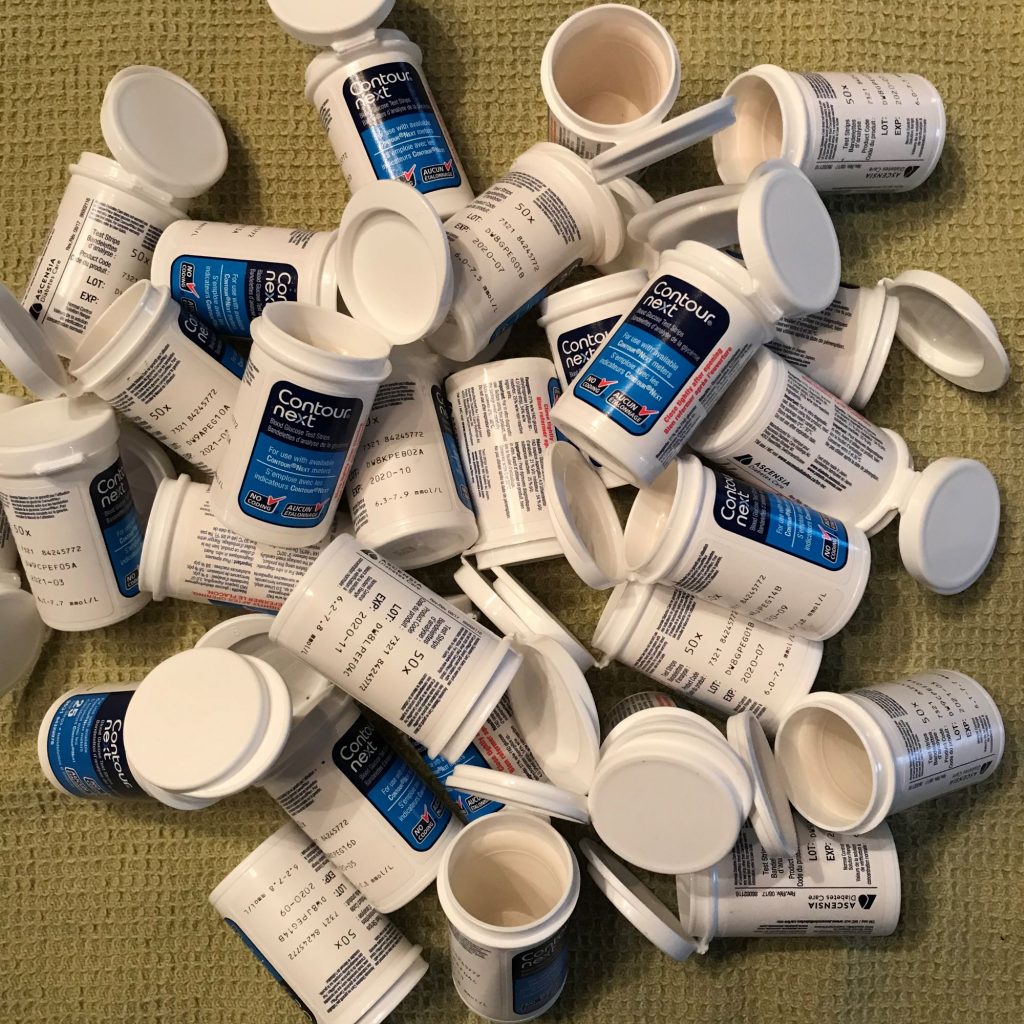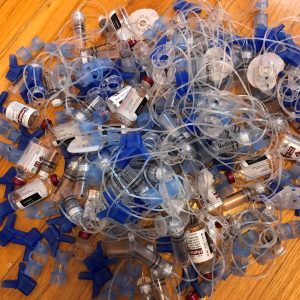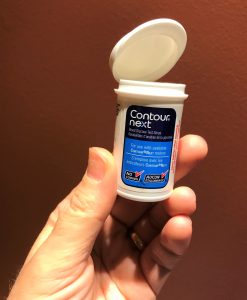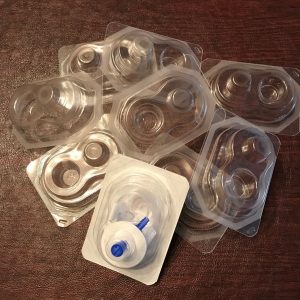
Sometimes, there is a direct conflict between personal care and planet care.
This is the case with my diabetes management. The amount of garbage I generate to stay healthy causes me mental anguish, verging on physical pain.
It shouldn’t have to be this way. I should be able to take care of both my diabetes and the planet.
 Some of the items used for the treatment of type one (insulin dependent) diabetes must be disposed of as medical waste because of contact with bodily fluids and/or because they are sharp. This includes syringes, tubing and infusion sets used by insulin pumps, and a variety of other supplies. Ideally, these items are collected in a puncture-proof container and returned to a pharmacy for eventual incineration.
Some of the items used for the treatment of type one (insulin dependent) diabetes must be disposed of as medical waste because of contact with bodily fluids and/or because they are sharp. This includes syringes, tubing and infusion sets used by insulin pumps, and a variety of other supplies. Ideally, these items are collected in a puncture-proof container and returned to a pharmacy for eventual incineration.
I can live with that until we come up with a cure for diabetes and/or a more environmentally-friendly approach to medical waste in general.
What I can no longer tolerate are the companies that make a lot of money from diseases like diabetes and that do not take responsibility for the full life cycle of the products they create, especially when it comes to packaging. For example, all those empty, plastic blood glucose test strip containers and the clear plastic shells from insulin infusion sets. What is a planet-loving diabetic to do with these?
I called two companies and got two very different answers. One unhelpful, confrontational, and belligerent. The other the exact opposite.
First the negative. When I called Ascensia Diabetes Care, the first customer care person I spoke to was very friendly, but she could not tell me what I should do with the empty Contour Next blood glucose test strip bottles spilling out of my closet beyond returning them to a pharmacy. Since this course of action leads to an incinerator, I asked to speak to her supervisor.
The supervisor did not want to come to the phone as he was in a meeting and passed along the message that he could send a prepaid envelope for me to return the bottles. I was excited about this until I discovered that they would then be deal with as medical waste (i.e. incinerated). I asked for the supervisor to call me when he was available. After a short pause, he came on the line.
 “There is no need for us to reclaim these bottles,” was his response to my question about Ascensia’s responsibility to manage the life cycle of the product the company creates. He insisted that Health Canada classifies these very clean, empty, plastic containers as a bio-hazard so they must go to a pharmacy with other medical waste. Trust me, these containers are no more a bio-hazard than a toilet paper tube or a BAND-AID® wrapper.
“There is no need for us to reclaim these bottles,” was his response to my question about Ascensia’s responsibility to manage the life cycle of the product the company creates. He insisted that Health Canada classifies these very clean, empty, plastic containers as a bio-hazard so they must go to a pharmacy with other medical waste. Trust me, these containers are no more a bio-hazard than a toilet paper tube or a BAND-AID® wrapper.
The representative was also incredulous that I would have so many empty bottles even after I explained the pain of not being able to recycle them and also my attempts to reuse them for such purposes as storing waterproof matches for camping with Girl Guides. He just didn’t get it, not at all.
My request to speak to someone in product development also met great resistance and the request for the name of someone to whom I could write was refused. I was given the mailing address of Ascencia Diabetes Care in Canada only grudgingly (after being told that I could look it up online). The phone call ended with neither one of us very happy.
 My next call was to Medtronic Canada. I wanted to know if the clear plastic shells and paper cover on their insulin pump infusion sets could be recycled. The short answers? Yes and no. The plastic shells are recyclable, but the paper is not because it is coated on one side to keep out moisture. Fair enough.
My next call was to Medtronic Canada. I wanted to know if the clear plastic shells and paper cover on their insulin pump infusion sets could be recycled. The short answers? Yes and no. The plastic shells are recyclable, but the paper is not because it is coated on one side to keep out moisture. Fair enough.
What I appreciated almost as much as the fact that plastic packaging is recyclable was the reaction to my query. The customer service rep I spoke to understood my concerns and appreciated my questions. He did not call the packaging a bio-hazard, nor did he shy away from the responsibility of Medtronic to consider the environmental impact of its products. The company’s website backs this up with a section in their governance policies on the environment and climate change.
All is not completely rosy for Medtronic, however. They do partner with Ascencsia to provide the blood glucose meters that link to their insulin pumps. That will be a phone call for another day.
In the meantime, if you would like some clean, waterproof containers for anything, please get in touch. I bet they’d make great geocaches!
